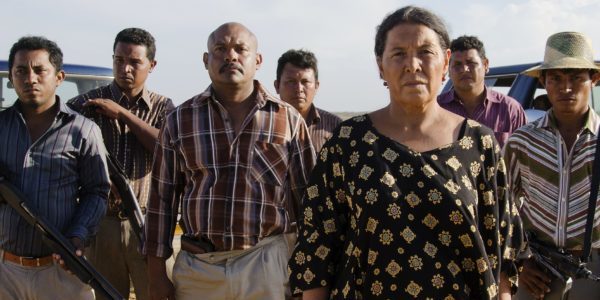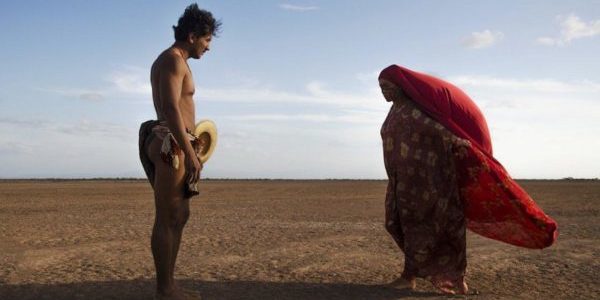Milwaukee Film Festival 2018: BIRDS OF PASSAGE

Midwesterner, movie lover, cinnamon enthusiast.
In the spring of 2016, Embrace of the Serpent, “[Y]oung people, when they see this film, think maybe their culture is important after all and that this knowledge, culture, and language that we don’t hear so much about may be their biggest asset … This culture and what it can give to the world is our biggest asset as a country, more than mining our natural resources.”
In a move that suggests depreciated optimism on behalf of the filmmaker, Guerra’s follow-up, Birds of Passage, co-directed by Guerra’s longtime producer Cristina Gallego, draws attention to the mining-at-large of Colombia’s natural resources.
Customs and Commerce
Specifically, the film chronicles a trio of Wayuu families in northern Colombia from 1969-1980 and how the developing marijuana trade creates mercurial legends and destroys embedded traditions. Here, maintaining the widescreen 35mm presentation of Embrace of the Serpent but discarding its black-and-white photography, the duo are, again, in no rush to get audiences from front to back. Over the first two of five chapters, Birds of Passage luxuriates on tradition as protagonist Rapayet (Jose Acosta) works to procure an expensive dowry for Zaida (Natalia Reyes), a young woman who is christened into eligibility as the film opens. We’re given a step-by-step process of what it means for Rapayet to gather, through many means of commerce, 50 goats, 20 cows and a number of particularly stoned necklaces — each transaction with its own tacit etiquette.

While working on the dowry, Rapayet and his friend Moses (Jhon Narvaez) take an opportunity to start selling marijuana when they get word that a couple white Peace Corps hippies are looking to score. In short, one deal snowballs into a bigger deal until Rapayet becomes a kingpin.
An Intellectual Exercise
The film is guided by the slow accumulation of power, revealing one fallout after another of capitalist ambitions that has seduced Rapayet. Traditional messengers — dedicated family members sanctioned to safe messaging between area families — are discarded for haste making. The mother hen and keeper of the talisman, Ursula (Carmina Martinez), becomes increasingly bitter as money renders the talisman obsolete. Moments like these play out over an austere, deliberately paced two hours and change, and while they are powerful articulations, abstractly, watching Birds of Passage feels much more like an intellectual exercise than an emotional one.
The most resonant scene comes early in the runtime, on Rapayet and Moses’ first attempt to track down marijuana. Through the aforementioned step-by-step process of bartering, trading and traveling to get the weed, Guerra and Gallego allow viewers an insight into the physical and mental taxation it takes for marijuana to end up in the hands of Americans (here represented by a young white man and woman). Once this first deal is done, the filmmakers wisely choose to never show the white couple (or any Americans) again, instead orders of marijuana triple and quadruple, illustrating Americans as agents of the invisible hand, benefitting at their whim from the degradation of ethnic traditions.

By juxtaposing the building of an empire with the fallout of family customs, the film offers a meaningful depiction of why such mores were in place to begin with: they offer a schema of checks and balances that privileges respect and, most importantly, keeps capitalist machinations at bay.
Birds of Passage: Conclusion
I might have thought about the implications of Birds of Passage more than most films this year, but again, it engages me as an academic essay would, not a poignant film. It could very well be that Guerra and Gallego purposefully strangled the pathos from their depiction of Wayuu life in 1970s Colombia, opting for an austerity that telligraphs the emotional decay of burgeoning capitalism, but by the fourth of five passages, I couldn’t help but feel underwhelmed and tested.
Perhaps it’s a personal wavelength difference between me and the duo as I was even more underwhelmed by the roundly praised Embrace of the Serpent. If so, viewers’ mileage may vary — critical consensus has been less kind to Birds of Passage — but where I found Guerra’s previous effort a struggle to wring anything specific out of, this one will remain lodged in my brain for quite some time.
Birds of Passage will be released in the U.S. on Feb. 13, 2019. For all international release dates, see here.
Does content like this matter to you?
Become a Member and support film journalism. Unlock access to all of Film Inquiry`s great articles. Join a community of like-minded readers who are passionate about cinema - get access to our private members Network, give back to independent filmmakers, and more.













